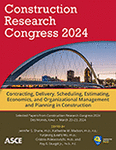Application of Chaos Theory in Project Management
Publication: Construction Research Congress 2024
ABSTRACT
Chaos theory, a mathematical discipline, delves into the behavior of dynamic systems highly susceptible to initial conditions, often called the butterfly effect. In project management, chaos theory becomes a tool for comprehending and predicting intricate systems, exemplified by large-scale engineering projects. Its application involves identifying and mitigating risks, improving decision-making, and enhancing overall project performance. By harnessing chaos theory, project managers attain profound insights into project dynamics, leading to more adept strategies for control and optimization. Consequently, the incorporation of chaos theory revolutionizes the management and refinement of complex systems. Nevertheless, scholarly exploration of chaos theory’s role in project management remains limited. This article aims to analyze the integration of chaos theory in project management and its specific benefits in the context of substantial engineering endeavors. It encompasses fundamental chaos theory principles, implementation techniques in project management, instances of successful real-world engineering projects, and prospects for future research in this domain.
Get full access to this article
View all available purchase options and get full access to this chapter.
REFERENCES
Bourne, L., and D. H. T. Walker. 2005. “The paradox of project control.” Team Performance Management, 11(5–6), 157–178.
Chen, H. L. 2014. “Improving Forecasting Accuracy of Project Earned Value Metrics: Linear Modeling Approach.” Journal of Management in Engineering, 30(2), 135–145. https://doi.org/10.1061/(ASCE)ME.1943-5479.0000187.
Cicmil, S., T. Cooke-Davies, L. Crawford, and K. Richardson. 2017. Exploring the complexity of projects: Implications of complexity theory for project management practice. Project Management Institute
Cleland, D. I. 2007a. Project Management: Strategic Design and Implementation (5th Edition). McGraw-Hill Education.
Curry, D. M. 2012. “Practical application of chaos theory to systems engineering.” Procedia Computer Science, 8, 39–44. https://doi.org/10.1016/J.PROCS.2012.01.011.
Fernandez-Solis, J. L. 2012. Building construction: “A deterministic non-periodic flow – A case study of chaos theories in tracking production flow.” Architectural Engineering and Design Management, 9(1), 21–48. https://doi.org/10.1080/17452007.2012.683671.
Flyvbjerg, B., M. S. Holm, and S. Buhl. 2002. “Underestimating costs in public works projects: Error or lie?” Journal of the American planning association, 68(3), 279–295. https://doi.org/10.1080/01944360208976273.
Galvez, E. A., J. Ordieres-Meré, and S. F. Capuz-Rizo. 2015. “Analysis of Project Duration Uncertainty using Global Sensitivity Analysis.” Journal of Modern Project Management. 2(3).
Kellert, S. 1993. In the wake of chaos: Unpredictable order in dynamical systems. University of Chicago press.
Kerzner, H. 2017. Project management: a systems approach to planning, scheduling, and controlling. John Wiley and Sons.
Kwak, Y. H., and F. T. Anbari. 2009. “Analyzing project management research: Perspectives from top management journals.” International journal of project management, 27(5), 435–446. https://doi.org/10.1016/j.ijproman.2008.08.004.
Lorenz, E. N. 1963. “Deterministic nonperiodic flow.” Journal of atmospheric sciences, 20(2), 130–141.
Meredith, J. R., S. M. Shafer, and S. J. Mantel Jr. 2017. Project management: a strategic managerial approach. John Wiley & Sons.
De Meyer, A., C. H. Loch, and M. T. Pich. 2002. “Managing project uncertainty: from variation to chaos.” MIT Sloan management review, 43(2), 60.
Nicholas, J. M., and H. Steyn. 2017. Project Management for Engineering, Business and Technology. Routledge. https://doi.org/10.4324/9781315676319.
Olaniran, O. J., P. E. D. Love, D. J. Edwards, O. Olatunji, and J. Matthews. 2016. “Chaos Theory: Implications for Cost Overrun Research in Hydrocarbon Megaprojects.” Journal of Construction Engineering and Management, 143(2), 05016020. https://doi.org/10.1061/(ASCE)CO.1943-7862.0001227.
Pellerin, R., and N. Perrier. 2019. “A review of methods, techniques and tools for project planning and control.” International Journal of Production Research, 57(7), 2160–2178. https://doi.org/10.1080/00207543.2018.1524168.
Qu, Y., H. Wang, and D. Li. 2015. “Analysis on Chaos Characteristic of Software Project Risk System Based on Method of Lyapunov Exponent.” LISS 2014, 1519–1524. https://doi.org/10.1007/978-3-662-43871-8_218.
Salhab, D., F. Alsakka, and F. Hamzeh. 2023. “A narrative review of workspace planning in construction: challenges and insights.” Proceedings of the 31st Annual Conference of the International Group for Lean Construction (IGLC31). https://doi.org/10.24928/2023/0161.
Smith, A. D. 2011. “Strategic aspects of contingency planning in chaotic environments and systems: Multi-case study.” International Journal of Business and Systems Research, 5(5), 423–442. https://doi.org/10.1504/IJBSR.2011.042092.
Templier, M., and G. Paré. 2015. “A framework for guiding and evaluating literature reviews.” Communications of the Association for Information Systems, 37(1), 6. https://doi.org/10.17705/1CAIS.03706.
Timina, I. A., S. K. Kiselev, and E. N. Egov. 2021. “Project Management on Base Analysis of Fuzzy Time Series of Project Activity Metrics.” Studies in Fuzziness and Soft Computing, 393, 553–566.
Watt, D., and K. Willey. 2005. “The complex, chaotic, and fractal nature of complex systems.” Conference Proceedings - IEEE International Conference on Systems, Man and Cybernetics, 4, 3155–3160. https://doi.org/10.1109/ICSMC.2005.1571631.
Information & Authors
Information
Published In
History
Published online: Mar 18, 2024
Authors
Metrics & Citations
Metrics
Citations
Download citation
If you have the appropriate software installed, you can download article citation data to the citation manager of your choice. Simply select your manager software from the list below and click Download.
